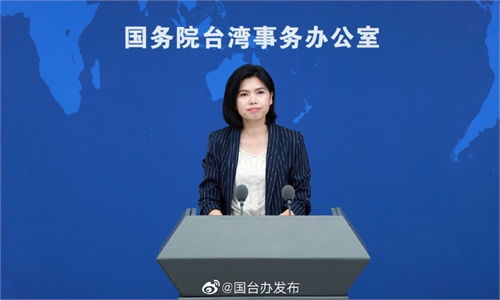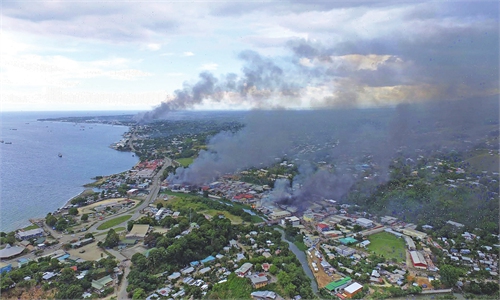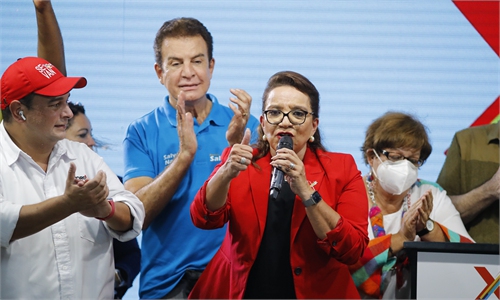IN-DEPTH / IN-DEPTH
GT investigates: Pro-secession DPP authority, US pull strings behind Taiwan's biased polls amid tense cross-Straits ties
Dulcet lies
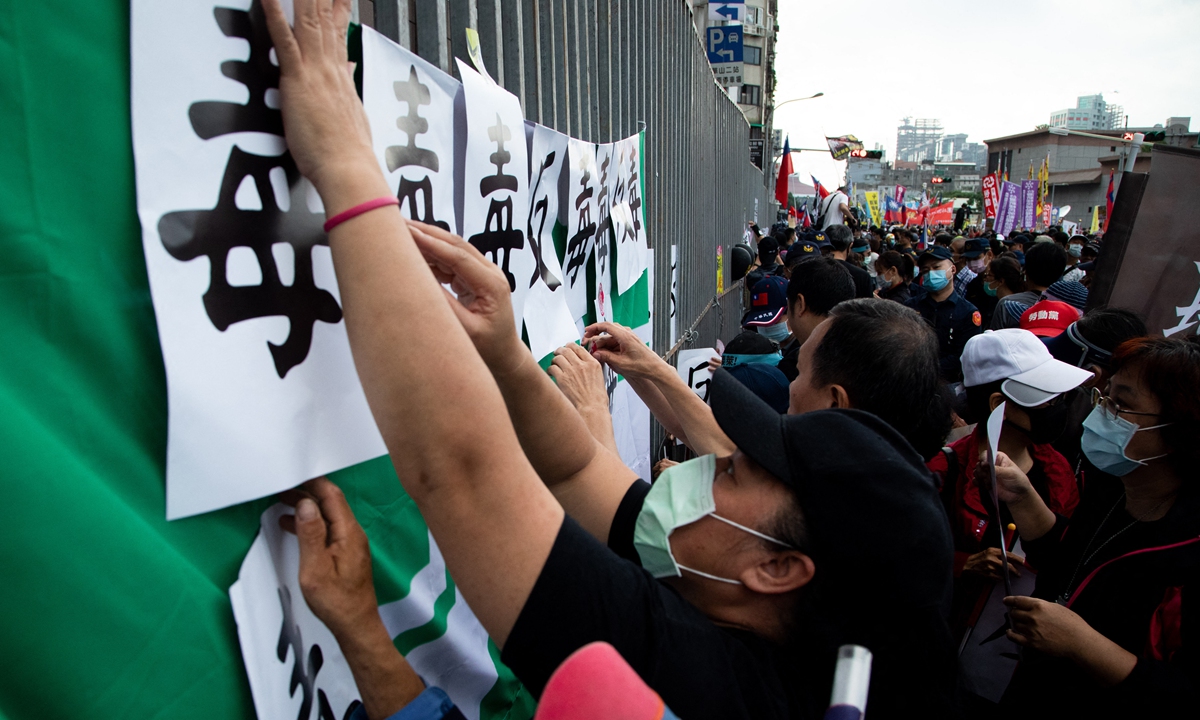
People stick signs that read "poison" in front of the Democratic Progressive Party's headquarters during a protest in Taipei on November 22, 2020. Photo: AFP
As cross-Straits relations become tense, some polls recently conducted on the island of Taiwan continue to deliberately gin up a pessimistic attitudes toward cross-Straits relations, with their objectivity and authenticity being widely questioned by people in both the Chinese mainland and the island of Taiwan.Reviewing the polls on the island in recent months, Global Times reporters found that many were conducted by Democratic Progressive Party(DPP)-backed institutes among very small sample populations with misleading questions. Worse still, some polling institutes were found to have colluded with US anti-China forces in an attempt to jointly manipulate Taiwan's public opinion, attempting to find fault lines along which to divide China.
Polls have become a political tool that the DPP and Western anti-China forces use in Taiwan, said Li Zhenguang, professor and deputy director at the Institute of Taiwan Studies under the Beijing Union University. "By bad-mouthing national reunification through the polls, they try to manipulate public opinion on the island and even the island's political direction," Li told the Global Times.
Untrustworthy polls
Based on an online search using the Chinese keywords "poll" and "cross-Straits relations," the Global Times found that among the 12 mainland-related polls released by various institutions on the island since June, only one poll reflected relative neutrality, while the rest were presented contrary to objective facts: To either present the people of Taiwan as supporters of "Taiwan independence," or to amplify their negative evaluation of the mainland government.
Most of these polls were conducted by DPP authorities or commissioned by the DPP-related institutions, or media outfits they fund or support.
For example, a routine poll released by the island's Mainland Affairs Council on November 18 claimed that 85.6 percent of respondents they had surveyed "did not support the 'one country, two systems' principle," with more than 85 percent disapproving the mainland's "attempts to threaten Taiwan with force," "diplomatic suppression," and "obstruction of Taiwan's cooperation with the US and other countries."
These poll results aren't trustworthy, Li told the Global Times. Many residents of Taiwan may not know much about the "one country, two systems" principle, Li said. "So how can there be that many people opposed to a thing they actually don't know?" he asked.
"Also, communications between the mainland and the island of Taiwan have benefited tens of thousands of people on the island, as we see an increasing number of businesspersons and students from the island openly express their expectations of good cross-Straits relations," Li said. "For most people in Taiwan, there is hope that the two sides can strengthen ties."
Having been to the island of Taiwan many times and often talked with local residents about these polls, Li found that there are many tricks in the island's polls. They usually have very small sample groups of several hundreds or even a thousand respondents and the samples are taken in an unscientific way, he said.
"As far as I know, Taiwan residents are very familiar with these polling institutes and their backgrounds, and know an institute is pro-unification or pro-division once they receive its call," Li said.
Under the circumstances, those who support reunification are usually reluctant to answer pro-division polling institutes' questions, said Li. "They may just hang up using whatever excuse," he said. "Therefore, most of the loyal respondents of DPP-backed polls are from the pro-green camp, which causes a huge sampling bias in the polls."
"I don't like this trend of polling on the island, and I have warned my family to hang up if they receive a call from a company undertaking a DPP polling project," said Leo Lu, a political science PhD student at the National Taiwan University in Taipei, noting these polls in Taiwan, especially those dominated or driven by the DPP, are not scientific or factual.
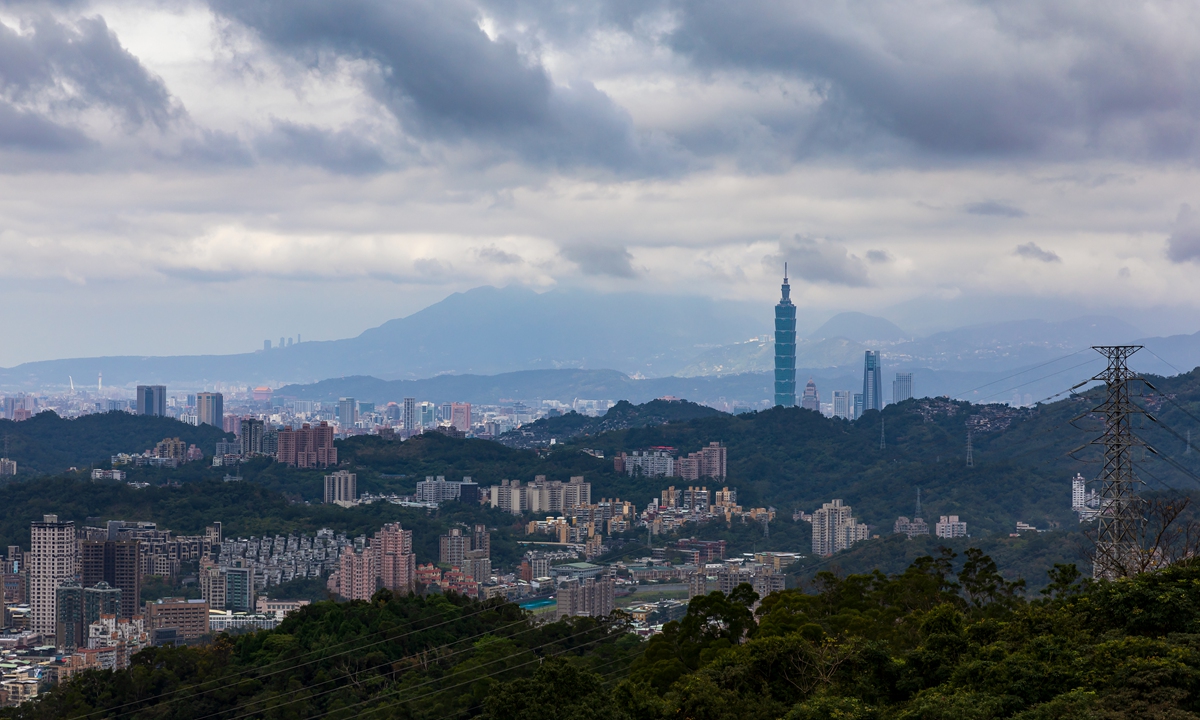
A view of Taipei. Photo:VCG
Lu noted that various media and research institutions on the island are keen to conduct such unrepresentative and unscientific polls. "Spending no more than three days, taking around 1,000 samples each time, and asking questions that are neither objective nor impartial, these polls are less formal than our academic work," he said."Telephone operators at DPP-commissioned polling companies are good at asking misleading questions, especially when they find that survey respondents are older and less educated, and will use dulcet tones to talk about family life, after gaining the respondents' trust. They will first tell you how good the DPP is, then ask questions. Should your answer not fit what they want, they'll keep asking while hinting at the 'wrong results' of your choice," Lu added.
What matters to them is not the process of the survey, but the dissemination of their long-predetermined polling results, he noted.
Separatist forces behind
Under DPP's control, most polls in the island of Taiwan seldom express the true opinions of local residents. "They are no more than a tool bought by separatist forces with money," observers told the Global Times.
The DPP-led green camp has much more money than the blue faction, and it gives a lot of money to local polling institutes to "get whatever results they want," Li said.
A poll claimed "nearly 90 percent of island residents oppose the 'one country, two systems' principle" for instance, was conducted in March by the Election Study Center of the Taipei-based National Chengchi University (NCCU) under the auspices of the island's "mainland affairs council."
Funded by DPP authorities, the center has been conducting polling related to "Taiwan-independence" for decades. According to the center's website, its member Yu Chen-hua, who reportedly colluded with Hong Kong secessionists, got a reward fund from the Tsai government - "a maximum limit of NT$100,000 ($3,590) over a period of up to 10 months" - along with his two coworkers at the center at the end of 2020.
The Taiwan Brain Trust (TBT) is a typical separatist-controlled polling institute in the island of Taiwan, founded by the island's long-time secessionist Koo Kwang-ming in 2010. TBT's current chairman is DPP legislator Chen Ting-fei, a secessionist who is infamous for her servile attitude toward the US.
When US President Joe Biden said in October that the US would "defend Taiwan" if the island was attacked, Chen said on Facebook that Biden's words made her "moved and grateful." Her remarks soon sparked outrage among the island's public.
The TBT is notorious for making up fake polls. Before the island's 2018 local elections, TBT released a polling report in July 2017 that said then DPP candidate Lai Ching-te enjoyed much more support than candidate Tsai Ing-wen. "Koo made the fake poll to support Lai, trying to create an atmosphere of overwhelming public support for Lai," Li pointed out. "But the result was that, Tsai defeated Lai."
The incident became a point of derision on the island.
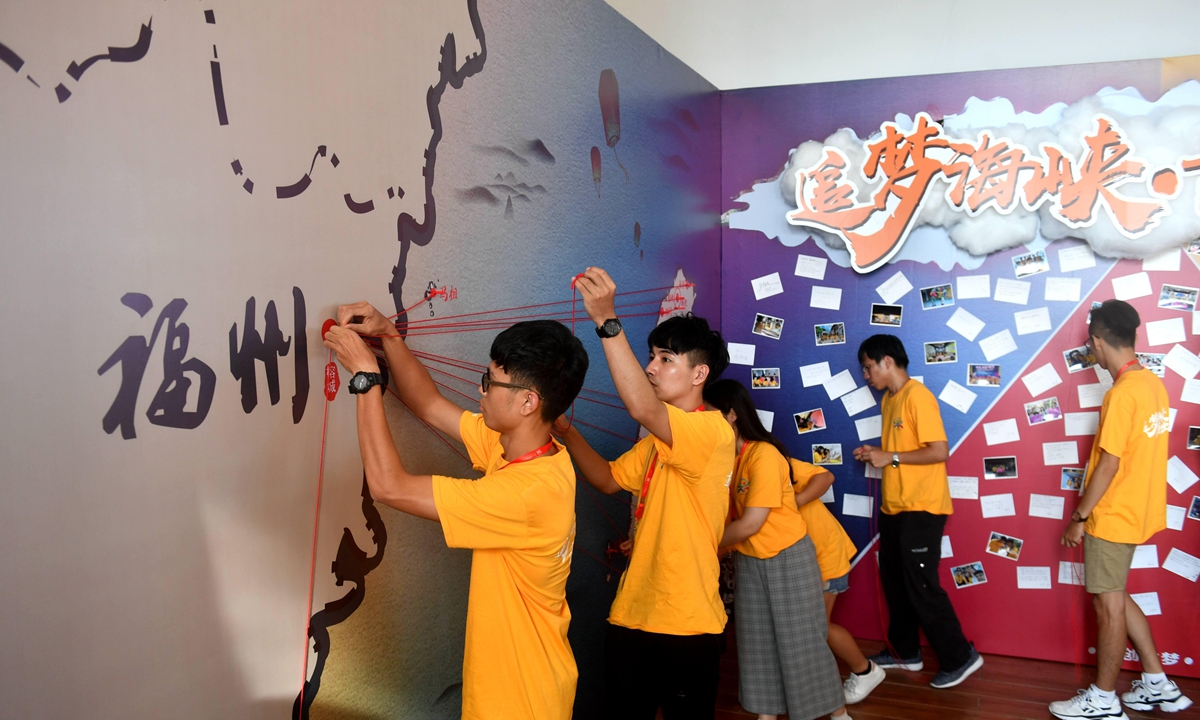
College students from the island of Taiwan connect their schools with Fuzhou, Fujian Province on the map at a cross-Straits youth exchange meeting on August 6, 2019. Photo: VCG
DPP authorities have always been good at concocting so-called polling data in an attempt to fool the island's society, which has no credibility, stated Taiwan Affairs Office spokesperson Zhu Fenglian at a press conference in September, in response to a question about a DPP poll indicating "most island residents oppose the 'one country, two systems' principle.""DPP authorities stubbornly stick to the separatist stance of 'Taiwan independence' and deliberately distort and slander the 'one country, two systems' principle for their own political gain. Their intentions are extremely sinister and will never succeed," Zhu noted. "We believe that our compatriots in the island of Taiwan can distinguish right from wrong."
Collude with US
For years, the US intelligence community and its "white glove" groups' collusion with the island's secessionist forces has become an open secret, scholars and residents across the Straits told the Global Times.
The Taiwan Foundation for Democracy (TFD) is an official institute set up during the term of Chen Shui-bian, former regional leader from the island who sought secessionism. The foundation, which usually releases biased polls to support its separatist claim, receives NT$ 150 million ($5.39 million) each year from the Taiwan authority, Hong Kong media reported in August 2018.
In the name of "democracy," TFD frequently colludes with foreign anti-China forces. In 2013 and 2014, it jointly held the infamous InterEthnic/InterFaith Leadership Conference with American veteran anti-China organizations National Endowment for Democracy (NED) and Citizen Power Initiatives for China. They openly invited Xizang (Tibetan) and Xinjiang separatists to attend the conference.
Yu Chen-hua of NCCU's Election Study Center has long been in league with Hong Kong secessionists, Hong Kong media revealed. According to an article by Hong Kong-based newspaper Ta Kung Pao in August 2018, Yu has been in partnership with Hong Kong separatist Chung Ting-yiu in conducting polls on secessionist topics including "the sense of identity" of Hong Kong and Taiwan residents.
Allegedly behind Chung were American anti-China forces. According to leaked emails, the National Democratic Institute (NDI) spent HK$77,000 ($9872) in supporting riots that year, which included working with Chung in conducting fake polls during the Occupy Central movement. Based on NDI's requirement, Chung's team added questions and modified words in the surveys, reported a Ta Kung Pao's investigative article in August 2018.
There are American forces behind the island of Taiwan's and Hong Kong's polls, Li said. "White-glove organizations like NED and NDI are always base camps for the US to manipulate color revolutions overseas," he told the Global Times. "In Taiwan, they won't miss any opportunity to control local public opinion."

